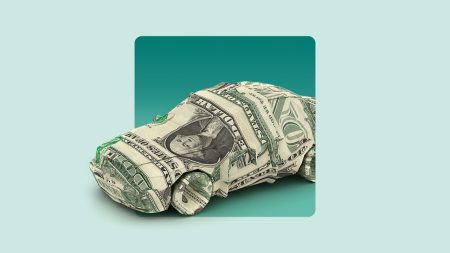Key takeaways
- A loan application, just like a credit card application, can temporarily lower your credit score due to the required hard credit check.
- Though this drop is temporary, it isn’t the only way a personal loan can hurt your credit score. Missed or late payments can also cause damage.
- That said, personal loans — or any type of loan — can also positively affect your score over time by contributing to your credit mix and payment history, among other factors.
When you apply for any type of credit, lenders must perform a hard credit check to view your credit file. This check may cause a temporary drop in your credit score. A personal loan also follows this rule — applying for one will knock your score by a few points.
Although the initial application may affect your credit negatively, making timely monthly payments can improve your payment history and credit score over time. Overall, personal loans can both harm and build your credit depending on how you use them, so it may be helpful to make managing a personal loan a top priority for your budget.
How does a personal loan affect credit score?
Before approving you for a loan, lenders must first check your creditworthiness and financial health. They do this through a credit inquiry or credit check. These checks can be soft or hard, depending on the purpose of the check.
Soft credit check
A soft credit inquiry or check is more of a general background check than anything else, so it doesn’t impact your credit. Because of this, it can be done with or without your consent, although most lenders will only perform a soft credit check during the preapproval process.
Some lenders offer soft credit checks to see what you may qualify for. This allows borrowers to view realistic offers without having to fill out a formal application and go through a hard credit check.
Hard credit check
When you apply for a personal loan, lenders will run a hard credit check to access your credit report and history. Hard credit checks temporarily lower your credit score by as much as 10 points, but if you have excellent credit, applying for a loan may only cause your score to drop by five points or fewer.
Though your credit score will typically recover within a few months, the hard credit check will stay on your credit report for up to two years. Because of this, lenders must ask for your consent before doing this type of inquiry.
You are required to submit additional documents when you apply for a personal loan, including proof of identity, employer and income verification and proof of address. Have these ready when you apply.
How personal loans could help your credit
When used responsibly, a personal loan can positively impact your credit score in a few ways, like improving your credit mix and boosting your payment history.
Provides a better credit mix
Adding various types of lending products to your portfolio helps keep your credit score high — as long as you stay on top of payments. It is generally a good idea to have a mix of installment loans and revolving credit.
Bankrate tip
Your credit mix accounts for 10 percent of your FICO score.
Boosts your payment history
A personal loan can help establish a positive payment history when made in full and on time. This is one of the most important factors that impacts your credit score, so having a long history of on-time payments will result in a credit boost.
That said, late or missed payments will have the opposite effect, lowering your score rapidly if you aren’t able to keep up. Before applying for a personal loan, calculate how much you can afford to be sure you can handle a new monthly payment.
Bankrate tip
Payment history accounts for 35 percent of your FICO score.
Reduces your credit utilization ratio
Lenders consider a low credit utilization a positive sign of your ability to manage debt, but a personal loan does not affect your credit utilization ratio directly. Only revolving accounts are used to calculate your amounts owed.
With that in mind, a personal loan to consolidate debt, especially credit card debt, may lower your credit utilization ratio. Once outstanding credit balances are paid off with a personal loan, you will have less revolving debt — provided you avoid using your cards for a while. So while you won’t change your credit utilization ratio with a personal loan, debt consolidation could lead to a better score over time.
Bankrate tip
Your credit utilization ratio accounts for 30 percent of your FICO score.
How personal loans could hurt your credit
Just like any other credit products, personal loans could potentially lower your credit score in several ways. Making regular, on-time payments will help you avoid some of the damage.
Hard inquiry on your credit
Due to the hard credit check, you will likely see a short-term drop in your credit score when you formally apply for the loan. New credit accounts for 10 percent of your credit score, but inquiries only stay on your credit report for 12 months.
Late or missed payments
If your payment is late by 30 days or more, the lender will likely report it to one or more credit bureaus. This negative mark can take approximately seven years to fall off your credit report and will ding your score. If enough time has passed and the account goes to collections, your credit score could drop between 90 and 110 points.
Increases your debt load
Before you apply, determine your debt-to-income ratio (DTI). Lenders like to see a lower DTI because it means you have more room in your budget to make monthly payments. When you take out a loan, it increases the amount of debt you have. If you already have too much debt, taking on a loan can limit your future access to credit because lenders will see you as a greater risk.
Shortens your credit history
Since length of credit history accounts for 15 percent of your FICO score, opening a new loan account can lower the average age of your credit. This could result in a small dip in your score. Over time, your account will age, which could offset the short-term hit to your credit.
What to consider before taking out a personal loan
Before taking out a loan, consider the benefits and drawbacks of adding another monthly bill to your budget.
- Reason for the loan: Personal loan lenders tend to offer different interest rates depending on the purpose of your loan. For instance, personal loans to consolidate debt may have a lower interest rate compared to one used to finance a vacation.
- How much it will add to your monthly costs: If you can’t comfortably afford a new monthly payment in addition to your current bills and debts, you may want to hold off on taking one out.
- Your credit score and history: Do you have a good credit score and healthy habits with your credit? If not, you can take steps to improve your credit score before applying.
- Your debt-to-income ratio: Your DTI measures your monthly debt relative to your income. Generally, the more debt you have, the less likely you will qualify for a loan.
Shopping around for the best personal loan for you is one of the most important steps to take. Each lender offers different interest rates, fees and terms. It’s especially important to prequalify if you have less-than-perfect credit — getting the best bad credit loan rate can save you hundreds of dollars in interest.
What credit score do you need for a personal loan?
To qualify for a personal loan, you’ll typically need a credit score of at least 580. Each lender has its own credit score requirements, and lenders offer the most competitive personal loan interest rates to borrowers with excellent credit. Applicants with a poor credit score may be offered rates that are as much as 30 percent higher than those with an excellent credit score. The average loan interest rate is 12.37 percent, but some lenders offer rates as low as 6.94 percent.
| FICO score | Average personal loan interest rate |
|---|---|
| Excellent (720-850) | 10.73%-12.50% |
| Good (690-719) | 13.50%-15.50% |
| Fair (630-689) | 17.80%-19.90% |
| Poor (300-629) | 28.50%-32.00% |
While the averages may seem high, personal loan rates for well-qualified borrowers start at just 6.94 percent. To get a competitive rate on your personal loan, prequalify with at least three lenders to see what your APR quotes will be.
Personal loan alternatives
If a personal loan is not the right choice for you, or if you want to explore options that may be available, consider alternatives like a credit-builder loan, secured credit card or a credit-building app. These can be better fits for some, but keep in mind that any application you submit will likely require a hard credit pull, which may lower your score for a few months.
- Credit-builder loans. Qualifying for a credit-builder loan is similar to a personal loan, but unlike a personal loan, you don’t receive any funds upfront. Instead, once the full loan amount has been paid, the loan funds will be disbursed. The lender reports your loan payments to credit bureaus, which helps build your credit score.
- Secured credit cards. Similar to credit-builder loans, secured credit cards require that you provide a cash deposit up front to set your credit limit. As you use your secured credit card, payments and changes to your credit utilization ratio will be reported to the three main credit bureaus.
- Credit-building apps. As their name implies, credit-building apps can help you improve your credit score. Some monitor your credit score for you, while others make bill payments on your behalf. Some may also offer small loans that are meant to help you build credit. Because services vary widely between apps, it’s best to compare options thoroughly before deciding.
Bottom line
Personal loans can be a great tool that can help you improve your credit score over time — but may lower it when you apply. At the end of the day, taking out a personal loan can affect your credit negatively or positively, but there are steps you can take to counteract this decline.
While you may experience a short-term dip when you submit your application, you could improve your credit score over the long run by making timely payments and using your loan funds to pay down existing debt. And as with any major financial decision, compare multiple lenders and prequalify to find the financing that best fits your situation.
Read the full article here










